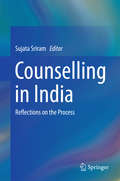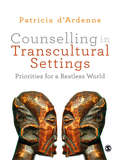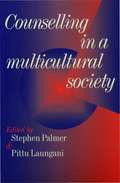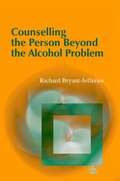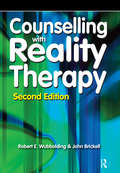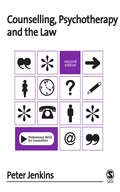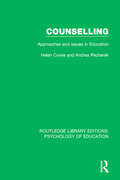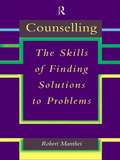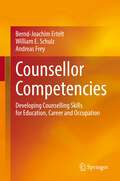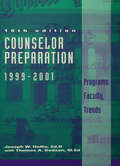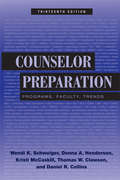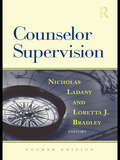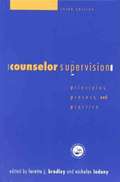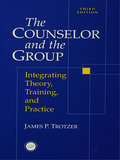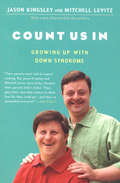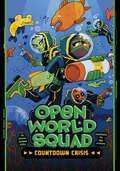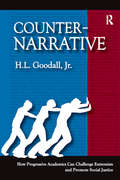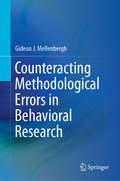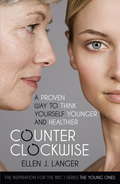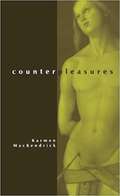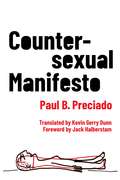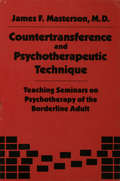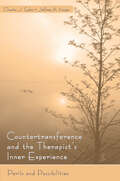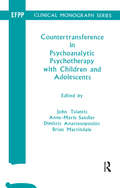- Table View
- List View
Counselling in India: Reflections on the Process
by Sujata SriramThis volume provides acritical and reflexive view into the counselling profession in India. Counselling and psychotherapy are emergent fields in India; there is inadequatesynergy between theory and practice at present, as psychotherapy andcounselling practice in the field have not sufficiently informed research, andvice versa. While research on counselling, the counselling process andtraining, and development of counsellors is extremely vital for the growth ofthe profession, practitioners seldom feel the need to wear the lens of theresearcher. Drawing upon primaryresearch on counsellors and psychotherapists in different parts of India, thisvolume bridges this gap and discusses the personal and professional journeys ofcounsellors at various stages of their career, which in turn facilitatesfurther research on counselling in India. The chapters discuss practical issueslike the challenges faced by novice counsellors, which contribute to feelingsof inadequacy and incompetence; synergy between the personal and professionallives of counsellors and the effect of the counselling process on the self;elements that go into training and how counselling education could bepositioned and developed; the use of creative arts in therapy; and therole of school counsellors and the process of negotiating boundaries amongvarious stakeholders in the school system. The volume also examines ethical dilemmas in the field, which have wider policyramifications.
Counselling in Transcultural Settings: Priorities for a Restless World
by Dr Patricia D'ArdenneDrawing on over 40 years experience, Patricia d'Ardenne provides the reader with a unique and practical introduction to counselling and psychotherapy in a world on the move, where ethnic, linguistic, religious, economic, political and environmental differences collide and create a rich and complex setting for contemporary therapeutic practice. Positioning counselling within the shifting contexts of the modern world, this book: - Examines anti-discriminatory practice - its origins and development - The complexities of working effectively with refugees, asylum seekers, vulnerable migrants, and the victims of human trafficking - Considers the needs of the cultural traveller - Address the intricacies of faith and spirituality - Provides a guide to assessing language and the role of interpreters - Addresses ethics, the law and transcultural issues in Healthcare - Looks at the importance of supervision, personal development and self care. Counselling in Transcultural Settings is an essential companion for counsellors and psychotherapists at all stages of professional training looking to work beyond their own culture, where the demands of therapy are as dynamic as the political and social contexts within which people seek help. Patricia D'Ardenne is a consultant clinical and counselling psychologist.
Counselling in a Multicultural Society (Multicultural Counselling Ser.)
by Stephen Palmer Pittu Laungani`The book aptly describes, explores and hits the core of very complex issues around race, racism, culture, difference, dual identity, stereotypes, immigration and alienation. . . It is also very thought-provoking, raising questions about one's own ability to work more flexibly in the consulting room with clients of different backgrounds. . . It is excellent for a directory of resources, useful for training purposes and an enabling "role model" for good practice in counselling in a multicultural society. I enjoyed it. . . It should be a required handbook on the shelf of every caring professional working within a multicultural environment or setting' - Transformations, The PCSR Journal This book examines the many comp
Counselling the Person Beyond the Alcohol Problem
by Richard Bryant-JefferiesAt the heart of Richard Bryant-Jefferies' work with problem drinkers is his belief in the power and effectiveness of the person-centred approach to counselling. He suggests that many alcohol problems develop out of, or are connected with, relationship difficulties. He highlights the importance of building a therapeutic relationship with the person, and of engaging with their individuality to encourage sustainable lifestyle change underpinned by personal growth. This practical book shows how such client-focused counselling can support problem drinkers who are seeking to develop and sustain a less alcohol-centred way of life. Demonstrating how the client-counsellor relationship can be harnessed to empower the individual to help themselves, Richard * describes the health risks and effects on family life of alcohol dependency * considers the differences between young and old problem drinkers * analyses the support services available to those seeking change * suggests ways of coping with relapse. Supported by contributions from clients who have undergone counselling for alcohol reliance, this is a comprehensive and positive guide for people working with those who have a problematic relationship with alcohol.
Counselling with Reality Therapy (Speechmark Editions Ser.)
by Robert WubboldingThis practical resource is a follow-on from the hugely successful Counselling with Reality Therapy. The second edition provides a jargon-free and practical explanation of a theory and method of counselling which can be used in any therapeutic relationship. It presents a comprehensive, succinct and practical overview of Reality Therapy and also contains ideas which can be used by parents, spouses, partners, children, family and anyone wishing for more satisfying relationships. This book forms an easy-to-use introduction to this approach and includes: a discussion of the concepts behind reality therapy, choice theory, the counselling environment, procedures and special applications; information on how this approach has a wide application, including developing responsibility, motivation, self-esteem, improving relationships, dealing with discipline and problems and addictions; details of how this approach can be used in schools, by the probation and prison services, at work, within clinics and the health service and in many other areas where counselling is applicable. Contents: A Brief History of Reality Therapy; Choice Theory: The Psychology Underlying Reality Therapy - An Overview; Creating the Counselling Relationship Parts 1 and 2; The Procedures that Lead to change: The 'WDEP System'; Reality Therapy and Group Counselling; Application to Schools; Relationship Counselling; Reality Therapy and Addictions Treatment; and Paradoxical Techniques. Robert E. Wubbolding EdD, LPCC, BCC, is an internationally known teacher, author and practitioner of Reality Therapy. John Brickell DC is Director of the Centre for Reality Therapy (UK) and a senior faculty member of the European Association for Reality Therapy (EART) and the William Glasser International (WGI) organisation.
Counselling, Psychotherapy and the Law: Ethics And The Law (Professional Skills for Counsellors Series)
by Mr Peter Jenkins`Jenkins' book makes the law relevant, understandable and manageable to counsellors and psychotherapists. It makes clear, reassuring and essential reading for therapists in training as well as those in practice. [All] counsellors and psychotherapisys need to be up to speed with the law and with how it relates to their work. This book is more than timely with the impending introduction of regulation, and the fact that increasingly the work of counsellors and psychotherapists is being subjected to legal scrutiny' - Healthcare Counselling and Psychotherapy Journal Counselling, Psychotherapy and the Law is the long-awaited Second Edition of Peter Jenkins' comprehensive introduction to legal issues in relation to counselling and psychotherapy in the UK. This text has been fully updated to include coverage of the key developments in the law that have had major impact on therapists' practice with regard to data protection and the management of confidentiality. The book breaks new ground by exploring in detail the relationship of ethics to the law and providing a framework for relating the BACP Ethical Framework to legal decision-making. Key features of this new edition include: " extensive use of case studies. These bring legal examples to life and give a human dimension to powerful ethical dilemmas such as seeking agreement to end medical treatment, or client's gaining access to their own confidential records " key points, which provide quick summaries of complex material and reference guides for professional practice " the multiple points of crossover and intersection of law and therapy. These are identified and explored, ranging from the use of narrative theory, to the provision of pre-trial therapy for abused children, to the role of the therapist as expert witness. This new edition provides clarity and reassurance for practitioners at all levels about the exact nature of their responsibilities, and how these can best be managed, in order to enable them to comply with the law and focus on their therapeutic work with clients. Counselling, Psychotherapy and the Law, Second Edition provides an essential source of reference in a single volume, making a fascinating and complex topic understandable and bringing it to life. Peter Jenkins, formerly a member of the BACP Professional Conduct Committee and currently a member of the Ethics Committee of the UKCP, has been described by Counselling at Work as 'probably the foremost authority on legal issues in counselling'. He is Co-Director of the Counselling and Psychotherapy Directorate at the University of Salford. More reviews: `Despite requiring real concentration, this is an essential read for counsellors and psychotherapists irrespective of background and theoretical orientation. Trainers, supervisors and agency coordinators especially would benefit from the up to date material contained here' - Therapy Today `Peter Jenkins has consulted widely over the content of this book, both within the psychological therapies field and with legal eagles. [His] use of clear flow diagrams and comparison boxes enable the reader to identify the similarities and differences between professional and moral/ethical debates. It is a thoroughly researched and accessible text' - Association for University and College Counselling Journal `a comprehensive overview of a rapidly evolving field. This book represents a helpful addition to practitioners' bookshelves as a reference work, but also a beneficial read to stimulate thoughtful responses to practical dilemmas. It provides a good support to both therapeutic and supervision practices across the spectrum of experience and theoretical models' - The Psychotherapist
Counselling: Approaches and Issues in Education (Routledge Library Editions: Psychology of Education)
by Helen Cowie Andrea PecherekOriginally published in 1994, the main function of this book was to provide to counsellors, trainee counsellors and teachers with pastoral care responsibilities, the knowledge and skills to support effective counselling. By drawing on their extensive pastoral and counselling experience gained in education and counselling, the authors produced a work which will also appeal to others involved in the care and protection of children and young people – including educational social workers, nurses, the police and educational psychologists. The authors integrate the development of counselling skills with a reflective stance on issues, approaches and ideas. They seek thus to increase the readers’ capacity to work sensitively and imaginatively with their clients, the sometimes troubled children and young people in primary and secondary schools.
Counselling: The Skills of Finding Solutions to Problems
by Robert MantheiDeveloping the ideas of his best-selling textbook Counselling: The Skills of Problem-Solving, Robert Manthei shows how to define and solve problems. Step-by-step he explains how to work in a planned way to enhance the client's self-understanding and increase their ability to find solutions to other problems in the future. Counselling has proved itself an invaluable resource for counsellors at every stage of their career and for anyone using counselling skills as a part of their work. This new edition is completely revised and introduces:* a solution-focused model* new material on: cross-cultural counsellingethicsself-evaluationprofessionalismadvocacy and mediationstresssupervisionand retains:* a skills-based approach* the stage-by-stage model* examples* exercises.
Counsellor Competencies: Developing Counselling Skills for Education, Career and Occupation
by Bernd-Joachim Ertelt William E. Schulz Andreas FreyCareer and student counselling is a complex task that requires a high level of professionalism. This book introduces basic counselling skills in vocational and educational guidance. It is based on important scientific models. The book presents internationally recognized counselling approaches which include among others micro counselling, solution focused brief counselling and competence oriented counselling. It also addresses possibilities for the use of artificial intelligence. The book offers direct guidance for the consulting practice and supports competence development through case studies, tasks and didactically designed exercises. It is suitable as a guide for the training of consulting professionals in the field of career guidance.
Counselor Preparation 1999-2001: Programs, Faculty, Trends
by Joseph W. HollisNow in its tenth edition, this classic reference contains vital information in three major areas: Detailed information on each of more than 500 graduate level departments with more than 1000 counselor preparation programs; Statistical treatment with interpretations of composite national research on the six largest types of entry level (master's and sixth year) and four doctoral level counseling programs; trends based on comparison of 1999 data with longitudinal data collected periodically since 1970. New in this tenth edition is a chapter on 'The Road to Professionalism which emphasizes the individual's need to gain strong backgrounds for certification and other programs. As in previous editions, all master's and doctoral level counselor and/or therapist preparation programs in the U.S. are listed, including community, marriage/family, mental health, pastoral, gerontological, rehabilitation, school, career, and student affairs counseling. Also noted are programs accredited by the American Association for Marriage and Family Therapy, American Association of Pastoral Counselors, Council for Accreditation of Counseling and Related Educational Programs, and Council on Rehabilitation Education - plus it identifies the location of Chi Sigma Iota (Counseling Society International) chapters.In addition to listing faculty by name, degree, title, and time devoted to each program, the text gives detailed information for each separate program: degree offered; accreditation held (if any); departmental addresses and telephone numbers; admission and graduation requirements; number of students admitted and graduating yearly; experiential clock hours; placement of graduates; and the uniqueness within the program. Courses to be added or dropped by counseling departments are listed, as are other anticipated changes within departments. Using a statistical treatment of the aforementioned data, the book also interprets the status and probable trends of preparation programs within each counseling specialty. Also considered are current emphases in the counseling field, and in what ways these are being reflected within counselor education settings.
Counselor Preparation: Programs, Faculty, Trends
by Wendi K. Schweiger Donna A. Henderson Kristi McCaskill Thomas W. Clawson Daniel R. CollinsSupported and proudly co-published by the National Board for Certified Counselors (NBCC), the largest certification organization for professional counselors in the world, the thirteenth edition of Counselor Preparation continues to be the only all inclusive, longitudinal national study of counselor preparation programs. It offers comparative data for administrative decisions and affords students and professionals the only comprehensive means available to evaluate an institution’s ability to meet personal requirements, academic needs, and career goals. This valuable resource includes: Detailed and current information on over 100 individual graduate institutions of higher education across the United States An expanded section on international programs Discussions of the counseling profession, the steps to becoming a credentialed counselor, and the various types of counseling programs available at the Master’s and Doctoral levels Chapters that critically examine the state of the profession now and predict future trends A special tribute to the Association for Counselor Education and Supervision (ACES), celebrating 60 years of contributions to the field New chapters from guest authors on the present state and future directions of ACES, the Council for Accreditation of Counseling and Related Educational Programs (CACREP), the Chi Sigma Iota Counseling Academic and Professional Honor Society International, the issues and needs of international students, and counselor training programs in Central and South America Responding Master’s and Doctoral level counselor education programs in the United States include community; mental health; clinical mental health, school; college; student affairs; career; marriage, couple and family; and counselor education and supervision. Data on each institution includes faculty and department demographics and contact information, as well as detailed information on individual programs. In addition, CACREP accredited programs, the flagship programs of counselor education, are highlighted. This is an outstanding resource for faculty, administrators, students, and practitioners alike and remains the authoritative and most comprehensive reference on counseling programs in the United States and around the world.
Counselor Supervision
by Nicholas LadanyThis new edition of Counseling Supervision is intended for counselor educators, counselor supervisor practitioners, and supervisors-in-training in a variety of educational and mental health settings. The editors have brought together experts in the field of counselor education to review and examine primary supervision theories and their application to the issues that counselor supervisors will encounter. Special topic areas included are multicultural issues in counselor supervision; the supervisory relationship, an essential and sometimes forgotten component of supervision, and its influence on supervision process and outcome; supervision of career counselor trainees; supervision of school counselors; supervision of family and group counselors; group supervision; understanding and conducting research in counselor supervision and training; ethical and advocacy issues in supervision, and supervisor training. The authors include numerous case examples throughout the text in order to illustrate the application of theory to practical issues that the counselor supervisors encounter. All chapters in this edition have been revised and updated, and new chapters have been added that expand on areas of supervision that are highly relevant to students, researchers, and practitioners.
Counselor Supervision: Principles, Process, and Practice (Third Edition)
by Loretta J. Bradley Nicholas LadanyCounselor Supervision: Principles, Process, and Practice (3rd edition) is intended for counselor educators and counselor supervisor practitioners who work in a variety of educational and mental health settings. Primary supervision theories are reviewed and critiqued with the intent of informing supervisor practitioners, counselor educators, and supervisor trainees. Additionally, cutting-edge topic areas are covered that include (a) multicultural issues in counselor supervision (e.g., how to balance and manage multiple identities such as gender, race, sexual orientation, age, and disability in the context of influencing trainees' multicultural competences), (b) the supervisory relationship (an essential but sometimes forgotten component of supervision) and its influence on supervision process and outcome, (c) supervision of career counselor trainees (e.g., supervision challenges unique to career counseling trainees such as integrating personal and career development), (d) supervision of school counselors (e.g., supervision challenges unique to school counselors such as confidentiality and balancing multiple roles), (e) supervision of family and group counselors, (f) group supervision, (g) understanding and conducting research in counselor supervision and training, (h) ethical and advocacy issues in supervision, and (i) supervisor training. Case examples are used throughout the book to illustrate the application of theory to practical issues that counselor supervisors encounter.
Counselor and The Group: Integrating Theory, Training, and Practice
by James P. TrotzerThe third edition of this text is expanded and embellished by the addition of chapters by noted group experts. It is logically organized into chapters that present the merits, rationale, dynamics, process and developmental tasks of group counseling. It discusses leader and member dynamics in depth, provides technical guidance for organizing and running groups, and gives special emphasis to the use of structured activities in groups and the relevance of family theory as a resource to group leaders.Readers will not only learn about groups but will learn how to lead groups. The group process model presented is explained clearly using language and diagrams that are easy to follow. The activities at the end of each chapter provide an experiential extension to the content so that readers can internalize and apply concepts. The book is intended to be a hands-on tool that will give credence to groups as a helping process in which clients learn to solve personal and interpersonal problems, learn and grow in personally meaningful ways.
Count Us In: Growing Up with Down Syndrome
by Jason Kingsley Mitchell LevitzTwo young men with Down syndrome talk frankly about careers, friendships, school, sex, marriage, politics, and independence. Recipient of seven national awards, including the EDI Award from the National Easter Seal Society. Foreword by Joan Ganz Cooney.
Countdown Crisis (Open World Squad)
by Michael Anthony SteeleThe gamer squad is on an Open World quest to save Atlantis from sea monsters! Thirteen-year-old Kai isn’t thrilled about this underwater level. He usually takes a background role managing the group’s supplies, but now he’s vital in giving out air refills or else it’s game over. Worse, Kai is feeling even more pressure IRL with an upcoming oral presentation at school. With help from the squad, can Kai figure out how to breathe deep and work through his anxiety? Game on with Open World Squad, an illustrated hi-lo chapter book series featuring exciting video game action and a winning mix of easy-to-read narrative text and in-game chat conversations.
Counter-Narrative: How Progressive Academics Can Challenge Extremists and Promote Social Justice
by H.L. Goodall JrGoodall portrays a world caught up in the middle of a narrative arms race, where the message of the political right has outflanked the message of the political left. It is a world where narratives used by the far right inch ever closer to those employed by right-wing extremists in the Muslim world. Rather than dismiss the use of political narratives as a shallow tactic of the opposition, Goodall promotes their usefulness and outlines a number of ways that liberal academics can retake the public discourse from the extremist opposition. This is an essential text for the aspiring public intellectual and will appeal to students and scholars of qualitative methods, communications and media, and political science alike.
Counter-cartographies: Neurodivergence and the Errancies of Performance
by Leon J. HiltonHow to remake the world with neurodivergence at its heart What if we embraced neurodivergent ways of being not as deviations to be corrected but as vital ways of inhabiting the world? What new realities might emerge? Bringing a much-needed humanistic perspective to the study of autism and other forms of neurodivergence, Counter-cartographies offers a bold reimagining of neurological difference, moving beyond rigid diagnostic frameworks to uncover more expansive, generative modes of existence. Engaging the work of Fernand Deligny to trace how modern taxonomies of neurodivergence have hardened over time, Leon J. Hilton questions how these categories might instead serve as tools for remapping the world with neurodivergence at its center. At the heart of Counter-cartographies is an exploration of performance and performativity that reveals how the norm of neurotypical reality is continually reinforced through acts of doing, redoing, and undoing. Charting the historical shift away from &“mind&” and toward &“brain&” and moving fluidly across disciplines—from digital art and documentary cinema to cybernetics and radical mental health movements—Hilton illuminates the deep interconnections between performance, perception, and the historical construction of the &“neurotypical.&” Through close readings of works by William Pope.L, Mel Baggs, Wu Tsang, and others, Hilton also examines how neurodivergence has been represented, embodied, and materialized in contemporary art and media. Restless, engrossing, and persistently attuned to moments of rupture when the neurotypical order falters, Counter-cartographies charts a path toward a more capacious, imaginative world. Retail e-book files for this title are screen-reader friendly with images accompanied by short alt text and/or extended descriptions.
Counteracting Methodological Errors in Behavioral Research
by Gideon J. MellenberghThis book describes methods to prevent avoidable errors and to correct unavoidable ones within the behavioral sciences. A distinguishing feature of this work is that it is accessible to students and researchers of substantive fields of the behavioral sciences and related fields (e.g., health sciences and social sciences). Discussed are methods for errors that come from human and other factors, and methods for errors within each of the aspects of empirical studies. This book focuses on how empirical research is threatened by different types of error, and how the behavioral sciences in particular are vulnerable due to the study of human behavior and human participation in studies. Methods to counteract errors are discussed in depth including how they can be applied in all aspects of empirical studies: sampling of participants, design and implementation of the study, instrumentation and operationalization of theoretical variables, analysis of the data, and reporting of the study results. Students and researchers of methodology, psychology, education, and statistics will find this book to be particularly valuable. Methodologists can use the book to advice clients on methodological issues of substantive research.
Counterclockwise: A Proven Way to Think Yourself Younger and Healthier
by Ellen LangerIf we could turn back the clock psychologically, could we also turn it back physically?For more than thirty years, award-winning psychologist Ellen Langer has studied this provocative question, and now, in Counterclockwise, she presents a conclusive answer: opening our minds to what's possible, instead of clinging to notions about what's not, can lead to better health - at any age.Drawing on landmark work in the field and her own body of colourful and highly original experiments, Langer shows that the magic of rejuvenation and ongoing good health lies in being aware of the ways we mindlessly react to social and cultural cues.With only subtle shifts in our thinking, our language, and in our expectations, she tells us that we can begin to change the ingrained behaviour that sap health, optimism, and vitality from our lives.Immensely readable and truly fascinating, Counterclockwise offers a transformative and bold new paradigm: the psychology of possibility. A hopeful and groundbreaking book by an author who has changed how people all over the world think and feel. Counterclockwise is sure to become a standard source on new-century science and healing.
Counterpleasures (Suny Series In Postmodern Culture)
by Karmen MacKendrickCounterpleasures takes up a series of literary and physical pleasures that do not appear to be pleasurable, ranging from saintly asceticism to Sadean narrative to leathersex. Each is placed in its cultural context to unfold a history of transgressive pleasure and to argue for the value and power of such pleasures as resistant to more totalizing forms of power.
Countersexual Manifesto (Critical Life Studies)
by Paul B. PreciadoCountersexual Manifesto is an outrageous yet rigorous work of trans theory, a performative literary text, and an insistent call to action. Seeking to overthrow all constraints on what can be done with and to the body, Paul B. Preciado offers a provocative challenge to even the most radical claims about gender, sexuality, and desire.Preciado lays out mock constitutional principles for a countersexual revolution that will recognize genitalia as technological objects and offers step-by-step illustrated instructions for dismantling the heterocentric social contract. He calls theorists such as Derrida, Foucault, Butler, and Haraway to task for not going nearly far enough in their attempts to deconstruct the naturalization of normative identities and behaviors. Preciado’s claim that the dildo precedes the penis—that artifice, not nature, comes first in the history of sexuality—forms the basis of his demand for new practices of sexual emancipation. He calls for a world of sexual plasticity and fabrication, of bio-printers and “dildonics,” and he invokes countersexuality’s roots in the history of sex toys, pornography, and drag in order to rupture the supposedly biological foundations of the heterocentric regime. His claims are extreme, but supported through meticulous readings of philosophy and theory, as well as popular culture. The Manifesto is now available in English translation for its twentieth anniversary, with a new introduction by Preciado. Countersexual Manifesto will disrupt feminism and queer theory and scandalize us all with its hyperbolic but deadly serious defiance of everything we’ve been told about sex.
Countertransference and Psychotherapeutic Technique: Teaching Seminars
by James F. Masterson, M.D.Published in 1986, Countertransference and Psychotherapeutic Technique is a valuable contribution to the field of Psychoanalysis. A multi-disciplinary overview providing new theories, critical analyses and the latest reasearch on this very fashionable topic. Includes chapters on consumption studies in anthropology, economics, history, sociology and many more areas.
Countertransference and the Therapist's Inner Experience: Perils and Possibilities
by Charles J. Gelso Jeffrey HayesCountertransference and the Therapist‘s Inner Experience explores the inner world of the psychotherapist and its influences on the relationship between psychotherapist and patient. This relationship is a major element determining the success of psychotherapy, in addition to determining how and to what extent psychotherapy works with each individual
Countertransference in Psychoanalytic Psychotherapy with Children and Adolescents (The\efpp Monograph Ser.)
by John Tsiantis Brian Martindale Anne-Marie Sandler Dtmitris AnastasopoulosThis collection of papers from psychoanalysts across Europe is intended to highlight the similarites and differences between approaches to working with children and adolescents. Part of the EFPP Monograph Series.
